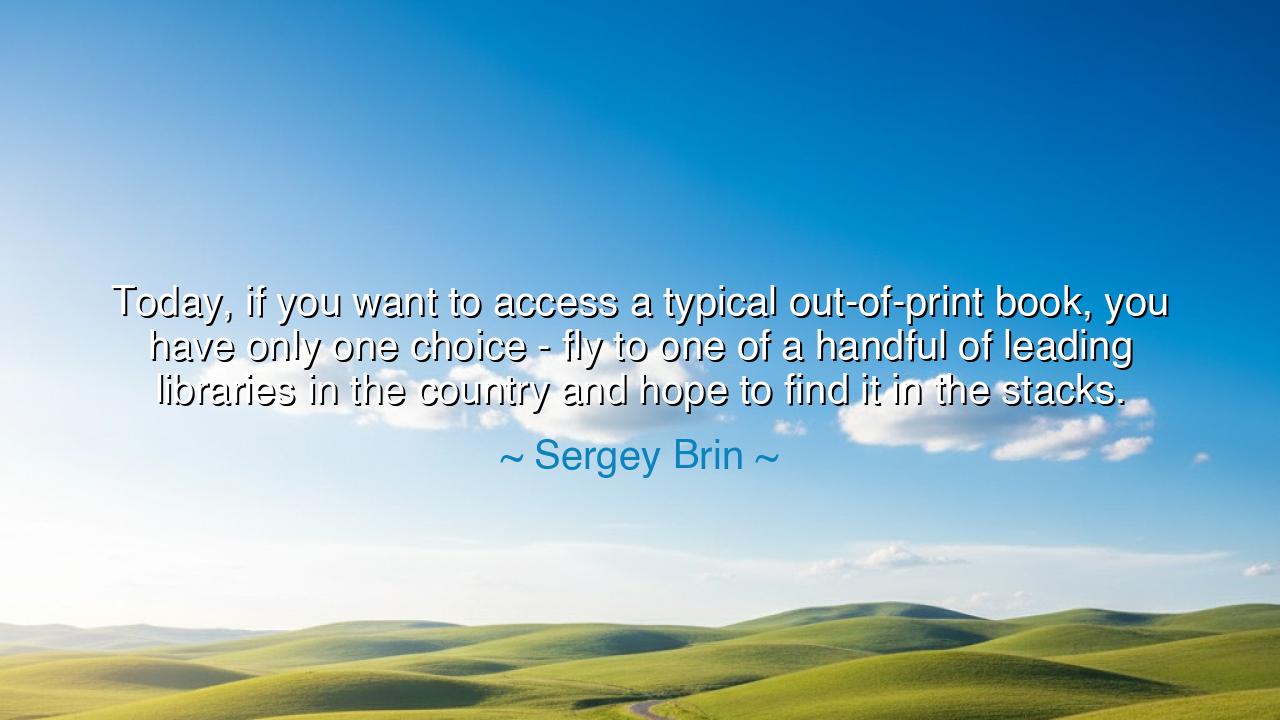
Today, if you want to access a typical out-of-print book, you
Today, if you want to access a typical out-of-print book, you have only one choice - fly to one of a handful of leading libraries in the country and hope to find it in the stacks.






Sergey Brin once observed with both foresight and lament: “Today, if you want to access a typical out-of-print book, you have only one choice — fly to one of a handful of leading libraries in the country and hope to find it in the stacks.” These words, spoken in the dawn of the digital age, reflect both the tragedy and the promise of human knowledge. Brin, co-founder of Google and a visionary of information, saw that the wisdom of centuries was locked away — not by malice, but by inaccessibility. In this statement, he calls attention to the fragility of human learning, and the sacred duty of each generation to preserve, expand, and share the light of knowledge before it fades into obscurity.
The origin of this quote lies in the early 2000s, when Brin and his company embarked upon one of the most ambitious projects of modern times: Google Books — a mission to digitize the vast collections of the world’s libraries, to make every book, even those forgotten or out of print, accessible to all. He saw how countless works — once written in passion, crafted with wisdom, and read by the few — had been left to gather dust in libraries that few could ever visit. In this era, the words of scholars, poets, and thinkers were not lost because they had no value, but because they could not be reached. To Brin, this was not merely a technological challenge — it was a moral one. For what is civilization, he asked, if the knowledge of the past remains imprisoned, seen only by those fortunate enough to stand before a certain shelf in a certain library?
The ancients would have understood his urgency well. For they, too, knew the tragedy of lost knowledge. Think of the Library of Alexandria, that great treasury of the ancient world, where scrolls from Greece, Egypt, Persia, and India were gathered beneath one roof. It was said that within those walls lay the wisdom of the world — mathematics, philosophy, astronomy, and art. Yet when fire consumed it, humanity lost not merely parchment, but memory itself. Civilizations have burned libraries before; ignorance and neglect have buried others. And so, Brin’s warning is not about books alone — it is a plea to guard against a second, quieter fire: the slow forgetting that comes when wisdom becomes inaccessible.
In Brin’s words, the “handful of leading libraries” stands as both a symbol of privilege and limitation. Knowledge, he reminds us, should not belong only to the few who can reach it by fortune or geography. The ancient philosophers believed that learning was the flame of the soul — the power that elevates human beings from beasts to creators. To hoard that flame is to betray our very nature. Thus, when Brin dreamed of digitizing the written word, he sought not to conquer information, but to liberate it. His vision was a modern echo of the same spirit that once guided Gutenberg when he invented the printing press: the belief that truth and beauty should not belong to the elite, but to all who seek them.
There is in this vision both hope and warning. For every age faces the temptation to let convenience or complacency bury its treasures. How many voices, once vibrant, have been lost because no one cared to listen? How many ideas, born from the fire of a human heart, have fallen silent because they could not be preserved or shared? Brin’s words challenge us to see knowledge not as an ornament, but as a living inheritance — one that must be protected, renewed, and shared. The greatest danger to civilization, he implies, is not ignorance itself, but indifference to knowledge.
History offers a powerful example of this truth. When Johannes Gutenberg unveiled his printing press in the 15th century, he shattered the chains that kept learning in the hands of a privileged few. Books that once required months to copy could now be multiplied by the hundreds. Ideas spread across borders, sparking the Renaissance, the Reformation, and the Age of Enlightenment. Brin’s vision stands upon that same foundation — the belief that access to knowledge transforms societies, frees minds, and births revolutions of thought. The printing press brought light to the Dark Ages; the digital revolution, Brin hoped, would bring the same light to a world burdened not by scarcity of books, but by their inaccessibility.
Let this, then, be the lesson: knowledge must flow like water, reaching every soul that thirsts for it. We must not allow wisdom to be locked away, whether by neglect, by greed, or by fear. To seek knowledge is a sacred act; to share it is nobler still. Each of us, in our time, must help preserve the written word — by reading, by teaching, by supporting the spread of truth. Let us not wait for the fire to consume the libraries of our age; let us be, instead, the builders of digital temples of learning, open to all who wish to enter.
For in the end, as Sergey Brin reminds us, the death of knowledge is the death of progress, and the preservation of it is the salvation of humanity. The scrolls of Alexandria may have burned, but their spirit lives on in every effort to keep wisdom alive. So let us, like the scribes and inventors before us, labor not for profit or fame, but for the promise that the words of one age may enlighten the next. For when knowledge is free, civilization breathes; and when it is shared, humanity endures.






AAdministratorAdministrator
Welcome, honored guests. Please leave a comment, we will respond soon